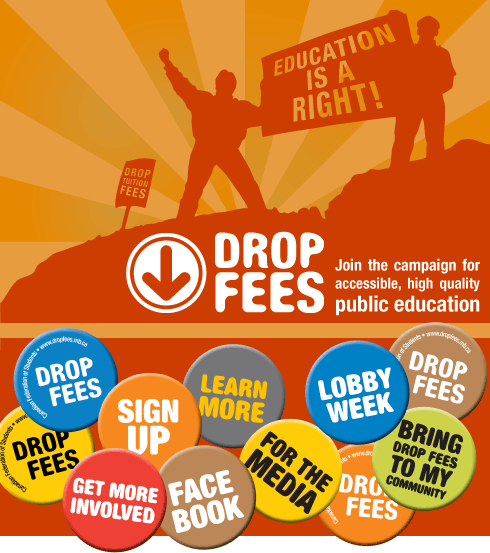On February 27, the Educational Policy Institute (EPI) — a conservative think-tank based in Virginia — released a position paper called ‘On the Brink’ that discusses how Canada’s post-secondary education system should respond to the recession. You might be able to guess the paper’s recommendations because they are the same recommendations EPI has for every economic circumstance: privatization.
Although the EPI paper has been embraced by university and college administrators looking for "independent" sources to justify "tough" decisions, a closer look at the paper’s proposals will reveal nothing new, and even a few factual nose-stretchers.
Among the EPI’s recommendations is a 25 per cent tuition fee increase, presumably because the report’s authors assert that "average family incomes have been rising for most of the decade." Set aside for a moment that despite recent gains, median family incomes are barely farther ahead of where they were 30 years ago; set aside that about half of Canadians say that they were one or two pay cheques away from being poor before the recession; and set aside that federal student debt has already reached $13 billion and is growing by over one million dollars per day. With all of these facts set aside for a moment, EPI’s call for fee increases is still irresponsible.
A 25 per cent hike in tuition fees is simply a regressive transfer of funds from poorer Canadians to wealthier ones. CCPA economist Hugh MacKenzie has written on income transfers and post-secondary education, outlining the flat tax nature of tuition fees. In other words, because of their relative contribution to the progressive income tax base, low- and middle-income families derive a greater benefit from universal government spending on education than do higher-income individuals. As is often the case, greater privatization of costs to individuals — in this case, in the form of fees — is detrimental to the majority of Canadians.
But politically-induced blindness to progressive taxation has always been EPI’s trademark. The EPI paper, which purports to be a primer about long-term consequences for government about the recession, makes nary a mention of the generous return to government from the income taxes of university graduates, nor is there a discussion about the reckless income tax cuts of the last decade. By ignoring the progressive taxing powers available to the government to help to protect families from drowning in student debt, Alex Usher confines himself to the intellectual low-hanging fruit of privatization.
Perhaps to appeal to the increasingly corporate-minded leadership at most universities, ‘On the Brink’ reads like a first-year management essay: university managers should rationalize human resources (teachers and researchers) to better achieve "cost containment" during changes in the "composition of demand" for education. Accordingly, "clients" can receive a more efficient "standardized" curriculum.
With the overuse of jargon, Usher is simply repackaging a conventional mantra for the corporate campus. Fighting campus unions and sacrificing expensive (but effective) teaching practices is nothing new to Canadian institutions. EPI has ensured itself victory in this area by passionately arguing for the status quo.
Perhaps the most crass strategy in ‘On the Brink’ involves spreading aggressive privatization beyond Canada’s borders to "tens of millions" of "clients" from developing nations ("growth markets"). According to EPI, "by far the most lucrative pot to chase is international students." This directive will surely resonate with many university presidents, who have been using international students and overseas campuses as cash cows for well over a decade. However, it is unlikely that most Canadians support aggressive siphoning of resources from nations who are no doubt going to experience the recession more profoundly than us.
The economic downturn presents the Canadian and provincial governments with an array of possibilities to use public education as fuel for the economic engine and an instrument to reduce socioeconomic inequality. On the Brink presents none of them.
As job losses pile up, broad access to affordable post-secondary education and training has to be a top priority. Privatizing the cost (and risk) to individuals and their families during massive economic uncertainty is unwise and unfair.
Postscript: For a delightfully condescending episode from Alex Usher, see his response to the media coverage of ‘On the Brink’ here.
Ian Boyko is the Campaigns & Government Relations Coordinator for the Canadian Federation of Students.



